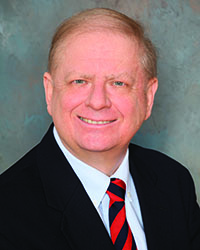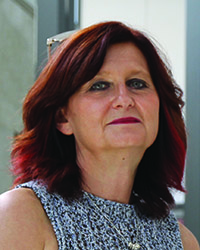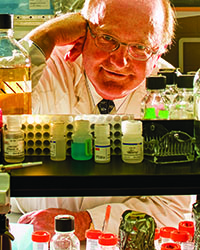
Maybe all you need is a shot in the arm
The vaccine debate
By HENRYTYE GLAZEBROOK
Maybe it starts with a mild fever, a scratch at the back of your throat or a cough you just can’t shake. Nothing a few days of bed rest won’t fix, hopefully.
But for an unlucky few, these are the first signs of a measles infection.
Measles is just one among a list of diseases that includes whooping cough and mumps, each of which was long considered nearly vanquished but has since had a resurgence as the anti-vaccination movement has grown.
“Measles we got two years ago, down in Regina, especially, but also a number of people in Alberta,” said Andrew Potter, director and CEO of the Vaccine and Infectious Disease Organization- International Vaccine Centre (VIDO-InterVac) at the University of Saskatchewan. “Measles in Canada is exceedingly rare. They managed to trace it to somebody who went to Disneyland. You go to Disneyland and there’s a bunch of kids and, bingo, it just spreads like wildfire.”
Vaccines, which stimulate the immune system with a microdose of a communicable disease to spark a response that leaves the human body better equipped to handle future encounters, are facing growing backlash in some circles. For Potter, who is also a professor of veterinary microbiology, this trend brings to mind worrisome memories of his own life prior to widespread immunization.
“When I was kid I had mumps, I had measles, I had whooping cough, I had them all,” he said. “The whole principle behind vaccination is that you end up essentially immune, not for life but for many, many years—sometimes decades.”
The general consensus is that there are two main drivers behind the rise of the anti-vaccination movement. The first, a marketing push from parties aiming to make an easy buck off a trendy topic, most experts are quick to brush off.
The second driver, however, originates from a much more familiar place of fear, even love: a misfounded belief that the procedure will place their family and children at risk of autism, which has been proven not to occur as a result of vaccination.

“One thing to keep in mind is that people are really concerned with doing the best thing for their children,” said Paul Thagard (BA’71), distinguished professor emeritus in philosophy with the University of Waterloo. “Nobody would want to do anything that would lead their child to become autistic or to have some serious issues. This is the good side of it: people are really motivated by a concern to do what’s best for their children.
“Unfortunately, that also makes them easily taken in by people who don't weigh the evidence very well and just rely on bad theories or bad evidence.”
Thagard, who has devoted an entire chapter in an upcoming book to the psychological ramifications of people moving away from immunization, largely attributes the trend to a confusion of correlation and causation, with many people watching the rise in both the number of vaccinations and diagnoses of autism as linked simply because of their similar trajectory.
“People have acquired the belief, partly because of bogus studies and partly because of pseudo science, that vaccinations cause autism,” he said. “The reason people might suspect that is that autism occurs around the same time as the earliest vaccinations, but that's a logical fallacy.”
Thagard looked to a 2015 University of California, Los Angeles study, which favoured emphasizing the potential consequences of not immunizing children, as one possible solution to steering naysayers back toward innoculations.
“You can't counter bad emotions with good evidence,” he said. “If the evidence isn't going to work and you're putting hundreds of people at risk of measles, then I think the emotion-based strategy—the fear-based strategy—is legitimate as well.”
The sentiment of using fear as a motivator may sound brazen, but Yvonne Shevchuk (BSP’80) explained just how much of a reality check it can be to see the aftermath of an infection.
Shevchuk, associate dean academic in the College of Pharmacy and Nutrition and director of medSask at the U of S, recalled witnessing firsthand as a child came to the hospital for treatment of meningitis, an infection that may have been avoided had they been immunized for Haemophilus influenzae type b.
By the time they returned home with their parents, the disease had rendered the child irreversibly blind and deaf.
“Kids come in who might be unconscious or having seizures, they have high fevers— they're very, very, very, ill,” she said. “Some recover without any issues, but some do have permanent problems.

“It really wasn't that many years ago when children would come in with that bacteria identified in their spinal fluid. It's a preventable disease. That's very devastating to the parent and to the child, who comes into this world perfectly normal and gets a disease and ends up blind and deaf for the rest of their life.”
The safety of vaccines is a foremost concern for Shevchuk, who explained that there is a rigorous inspection process performed before any immunizations go out to the Canadian public. Even the trace amounts of mercury contained in some innoculations, she said, is slight enough to be harmless.
"We know that mercury is not a safe substance, it's a toxic substance, but there's mercury around us,” she said.
“We can't completely eliminate mercury from our environment, and the amount of mercury that you actually get from a vaccine is minute compared to that. There really isn't a risk of toxicity.”
The reality is that not all people are going to get vaccinated, sometimes due to their own issues of health, their personal religious beliefs or other circumstances. What’s vital is to retain what’s known as herd immunity.
The phrase refers to the concept that if a large enough percentage of the population is immunized—the specific amounts vary from one disease to the next—then the relatively few number of available hosts makes it difficult for illness to flourish, creating a kind of shield for those who can’t or won’t get vaccinated.
But problems can arise if people start to take that shield for granted.

“I've had discussions with people who don't think they need to get vaccinated because of herd immunity, and I think that is an extremely selfish approach,” said Lorne Babiuk (BA’67, MA’69, DSc’72), who was there on the ground floor when VIDO first opened in 1975 and eventually went on to become its executive director and set in motion the creation of InterVac, a $140-million level three biocontainment facility, designed to combat diseases including pandemic influenza, tuberculosis and numerous others.
“You're not willing to immunize your child, and you just think that everybody else is going to do it for you.”
Babiuk, who was a U of S Canada Research Chair in Vaccinology and Biotechnology before becoming the vice-president research at the University of Alberta in 2007, is a staunch defender of vaccination both as a safe tool for warding off disease and as a less financially burdensome method of preventative treatment.
“These vaccines don't get licensed if they are not safe,” he said. “If you had cancer, you would take all kinds of drugs that would have your hair fall out, you'd have diarrhea and all other kinds of side-effects, but you'd be perfectly willing to do that because that's the treatment. We’re becoming a fire engine medical society, but with preventative medicine you can have no side effects, no inconvenience.”
What scares Babiuk most is the thought that people have lost sight of the sheer scale of illness that vaccination has prevented. He sees children getting infected with whooping cough or measles—a stark flashback to days he thought long-since gone—and knows for a fact that immunization could have helped avoid such pain.
“Vaccines have actually been too effective, and what's happened is that a lot of the people have not seen the devastation of these diseases; they sort of think that they're nothing, and absolutely nothing could be further from the truth,” Babiuk said.
“There is no need for suffering if we have ways to eliminate it.”
But despite his concerns, Babiuk remains hopeful.
“I'm always an optimist, so I hope that our society will recognize the follies of the ways of the anti-vaccine people.”
One shot at a time
Since April of 2015, the College of Pharmacy and Nutrition’s Continuing Professional Development for Pharmacy Professionals (CPDPP) office at the University of Saskatchewan has trained 1,191 provincial pharmacists to administer injections like the flu vaccine.
The training program combines online and in-person educational components to ensure pharmacists have the required skills to properly administer medications and the flu vaccine by injection.
“Pharmacists are ideally situated to administer injections. Our patients have welcomed the convenience of receiving their flu shot at their local pharmacy, and pharmacists in Saskatchewan administered over 90,000 flu shots last season,” said Danielle Larocque, associate director of CPDPP
During September and October of this year, an additional 90 pharmacists will be trained to administer injections.


